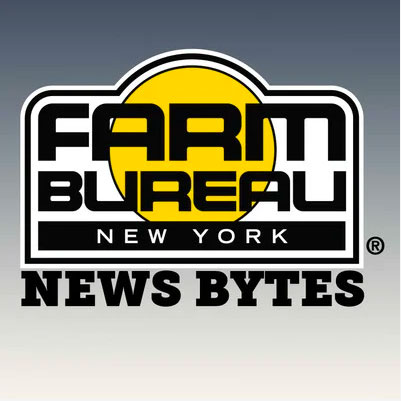NY Farm Bureau Partners with NY FarmNet to Launch Mental Health Campaign
Campaign seeks to bring awareness to farming challenges, stressors and available resources during Mental Health Awareness Month in May
Albany, NY — New York Farm Bureau (NYFB) and NY FarmNet, in recognition of Mental Health Awareness Month, have launched a campaign to run for the month of May. The campaign will focus on the resources available to farmers and their families who struggle with mental health issues.
A 2021 American Farm Bureau Federation (AFBF) survey titled “Farmer and Rural Perceptions of Mental Health” found that a majority of rural adults (59%) say there is at least some stigma around stress and mental health in the agriculture community, including 63% of farmers/farm workers. And, while there was an 11% decrease in farmers/farm workers who say stigma is an obstacle to seeking help or treatment for a mental health condition, nearly two-thirds agree it is still an obstacle.
NYFB President David Fisher said the importance of mental health awareness in the farming community is clear.
“Most people know that farming is a challenging occupation, but few outside the world of agriculture truly understand the struggles farmers can face every day. Changing and often unpredictable weather patterns, crop-damaging pests, equipment breakdowns and accidents, family dynamics, and especially financial worries are all potential stressors for farmers,” Fisher said. “With the help of NY FarmNet, we at Farm Bureau want to remind those who are struggling that there are resources and people available to help you. We also encourage you to check in on your friends and neighbors – just sharing a cup of coffee or a simple conversation can go a long way.”
Those outreach efforts are particularly important because many in the farming community are hesitant to speak with anyone about their struggles, which can lead to dangerous coping mechanisms such as drugs and alcohol. In fact, a 2017 AFBF report found that three of four farmers say it would be easy to access opioids. Even more disturbing, the National Rural Health Association finds that farmers and ranchers are 3.5 times more likely to die by suicide than the general population.
Further contributors to stress include the inherent danger involved in farming — an occupation with one of the highest fatal injury rates — and the steady loss of farms across the country. The 2022 U.S. Census of Agriculture found that between 2012 and 2022, New York lost nearly 14% of its farms and more than 9% of its farmland.
“The challenges faced by rural residents — including geographic isolation, the stigma surrounding mental health, and limited access to professional care — underscore the urgent need for increased awareness and proactive intervention. Farmers and agricultural workers encounter unique stressors such as financial uncertainty, extreme weather conditions, and a demanding work environment, all of which make mental health support a crucial component of a farmer’s overall well-being,” said Greg Mruk, executive director of NY FarmNet, which employs financial and family consultants to assist farmers across New York.
Resources available
Despite the myriad issues affecting farmers’ mental health, NY FarmNet Outreach Director Adam Howell said his organization is seeing improvements in some areas.
“We’re seeing a major shift where rural and agricultural communities in New York and across the nation are more open to discussing mental health and wellness. Some farming pressures are centuries old, while others are new, but it’s essential for farmers to know they’re not alone,” Howell said. “In New York, a strong support network is ready to help farmers manage stress, anxiety and depression.”
NY FarmNet connects farmers with a multitude of resources, from mental health counselors to financial advisors. NY FarmNet family consultants provide services and support at no cost to the farmer and are completely confidential. They also offer many educational sessions throughout the year, including “Talk Saves Lives,” a one-hour training presentation that provides attendees with a community-based approach to suicide awareness and prevention.
NY FarmNet can be reached at (800) 547-3276 or nyfarmnet@cornell.edu. Howell emphasizes, however, that the organization is not a crisis intervention service, and that those in immediate need should call or text 988 or visit 988lifeline.org.
Know the warning signs – and how to help
NY FarmNet’s website, www.nyfarmnet.org, lists signs of stress as they may occur in farmers. These warning signs include:
- Change in routines
- Decline in the care of domestic animals
- Increase in illness
- Increase in farm accidents
- Decline in appearance of the farmstead
- Signs of stress in children
- Decreased interest in activities or community events
If someone you know is exhibiting these signs, there are ways you can help:
- Listen without judgment. Provide opportunities for the farmer to talk about what they are going through.
- Watch for signs that the individual needs professional help you can’t provide, such as financial, legal or personal counseling.
- Access the agency or community resource most appropriate to address the problem.
- Discuss the referral (“It sounds/looks like you are feeling _____. I think ____ could help you deal with your situation.”)
- Explore the individual’s or family’s willingness to initiate contact with the community resource (“How do you feel about seeking help from this person/agency?” or “Can I help you contact _____ at this agency?”)
The most important thing, Howell says, is to show up — and show you care. Even if you don’t have the answers, you might provide the incentive the farmer needs to seek help.
“Farmers are essential to New York’s economy and cultural heritage,” Howell said. “Healthy farms depend on healthy farmers.”
-30-
New York Farm Bureau is the state’s largest general agricultural advocacy organization. Its members and the public know the organization as “The Voice of New York Agriculture.” New York Farm Bureau is dedicated to solving the economic and public policy issues challenging the agricultural community.



